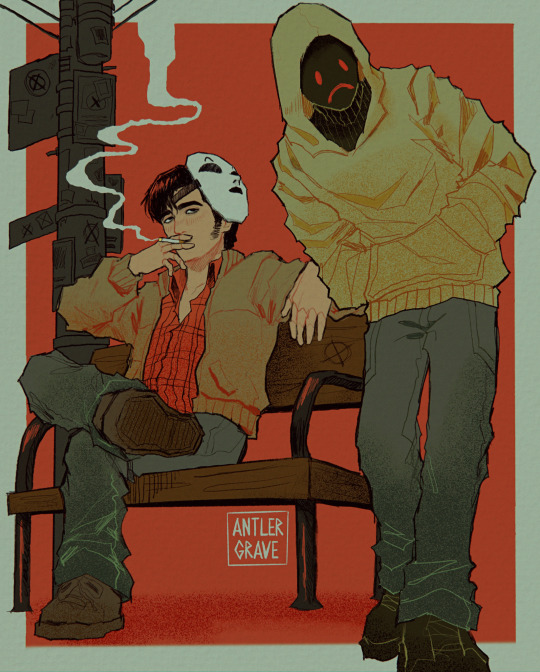Text
Divine Inner Tension by Hail The Sun is Transgender!
requested by anon
42 notes
·
View notes
Text

==MASHLE DOMINA REDRAW==
First thing i wanna say is. if u saw the first post no u didnt. i forgot to switch on the right account m so sorry :’[ !!!!
second thing is GO WATCH/READ MASHLE IF U HAVENT ALREADY!!! (preferably read as Domina isn���t introduced in the anime yet. Great humor interesting plot funny but charming characters and, most importantly of them all, DOMINA IS IN IT!!!!! Domina the girlboy that you are….. Hes everything 2 me I WONT SAY ANYTHING OTHER THAN THAT!! BC spoilers!! Just love the guy. a lot yes!!!!!!! :DDDD
OG panel + B&W version down here!! vvvv


#domina#domina blowelive#domina mashle#mashle#mashle fanart#SO SORRY FOR THE REPOST AGAIN i feel so bad#but i got to talk abt domina again so rlly i feel good#DOMINA >’!-+!-/&8-!@&+/7@&+7#i screamed today when i realized im gonna see him MOVE!!!! ANIMATED!!#MAYBE EVEN HAVE OFFICIAL PLUSHIES ANS FIGURINES OF HIM!!!#mso exocted#i just bit my knuckles#domina :[[[[[
0 notes
Text
mlp cool
So in an ask one duder mentioned mlp cast as mobians so I thought it'be funny to try
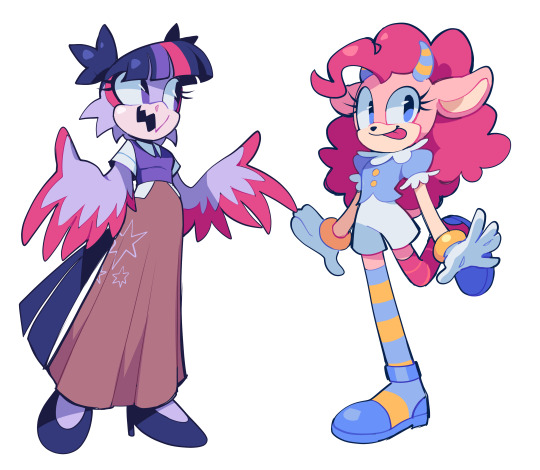

Mind: I'm not much of an mlp fan, so i'm sorry if like uhhhh I didn't get it all that right
Btw, luvs, I have a twitter where I usually Sonic-unrelated stuff, would be gratetful if you checked it <33
#THATS SOOOO RAD WTF#MY BRAIN ACTUALLY DID A LOOPING#i should read the idv comics are they called idv why are they called idv wtf
41K notes
·
View notes
Text
Cowboys Are Frequently, Secretly Fond of Each Other
1K notes
·
View notes
Text

charthur
#im gonna cry yall dont get it I MISS THEM#SM LIKE TO A DEADLY POINT#i wanna replay rdr2 where its just me following charles around and pestering him#hesso beautiful here#both of them
7K notes
·
View notes
Text




Had this au spinning around my head for awhile, finally got some drawings done for it lol
It’s a complete reverse au where instead of the Magnus Institute and Jon being the chosen one, it’s Martin and it’s now a Lonley aligned hotel: The Lukas Hotels, where you’ll never want to leave.
Also don’t mind the layout inconsistencies I am still working on how this hotel looks
3K notes
·
View notes
Text

FIRST TRY AT ALICE’S DESIGN
Alice is so hard to draw… she needs to be the most transgender possible its very hard to put all my trans superpowers into one character but i’m managing!!!!!! Shes so fun honestly I love her accent and semi cynical humor shes so great and plz dont kill her first ty ^^
#tmagp fanart#the magnus protocol#alice dyer#this one thing abt questioning sexuality bc of q fictional character#yea /j#she and sam are my fav trans lesbians#u cant take them away from me!!!!#tmagp#the magnus protocol fanart#alice dyer fanart
388 notes
·
View notes
Text

THE MAGNUS PROTOCOL IS OUT WHO CHEERED!!!!
Only two episodes in and we already have an evil non binary flesh avatar what a beautiful day indeed!!!!
Please ignore the fact that Ink5oul is described as pretty unnoticeable I’ve decided that it’s just their powers that are protecting them and that I like having fun more than following canon !!!!! FUNFUNFUNFUNFUN!!!
#the magnus protocol#tmagp#tmagp spoilers#the magnus protocol spoilers#ep 2 making adjustments#im so SOOOO happy#this new serie is reviving my tma brainrot we love to see it#ink5oul#tmagp fanart
102 notes
·
View notes
Text
WHATSUP QUEERS!!! hows it hanging anwyzys !!!! My two oc’s Samael and Avotrasoa!!! Im very normal abt them and I totally know what their deal is👍👍👍👍
#current wip#i wish i knew all abt the art of tumblring…#ill get the hang of it#eventually….#cw eyestrain#one time someone tagged my art this and i never recovered sinve#AS IN i didnt even realize it WAS eyestrain#I dont do it on purpse i swear yall#when i draw my vision goes dark my vision fades away and when i come to again its to gay people on my screen#dont ask me how it works
2 notes
·
View notes
Text
how to write speech impediments
(this is part of my series, how to write children in fanfiction! feel free to check it out if you want more info like this! though this guide is mostly directed towards writing children, it is also helpful for writing about speech impediments for people of all ages, since speech impediments don't always go away in childhood.)
there are a lot of different speech impediments out there, but the main one i see represented in children in fanfiction is what's known as an articulation error, mostly in the letters "r" and "l". this leads to the child saying the word "playground" and pronouncing it like "p-way-g-wound". while this is a speech impediment that is common in children, there are other speech impediments that are just as common. here are a few:
1 - stuttering:
now, i see a lot of stuttering that is written incorrectly. most of the time, stuttering is not just repeating the first syllable of the word three or four times. stuttering is a condition in which your muscles twitch or move uncontrollably while you talk. a lot of people interpret stuttering as a nervous tic, but the term for that would be stammering. stuttering is a different ballpark.
here are some possible symptoms of stuttering:
repeating sounds or syllables. this is the one i just talked about. while it is commonly the first syllable that is repeated, this isn't always the case, and this is only one symptom. here is a bad and a good example of this symptom in writing:
-bad: "w-when will my leg f-feel better, d-daddy?"
-good: "wh-when will my leg fe-ee-feel better, d-d-da-daddy?"
there are a few subtle differences between the bad and the good example. the first difference is that instead of just the first letter being written in the stutter, it's the entire first syllable that is either being stuttered from the get go, or it is being developed through the stutter. this better illustrates for the reader what the stutter actually sounds like to a listener rather than just showing a reader that it's there. also, in the word "feel", the stutter is placed in the middle of the word rather than the beginning. since stuttering is an unpredictable and uncontrollable muscular movement, it is highly possible for a stutter to show up in the middle of the word versus purely in the beginning. this will make the stutter more accurate. the last difference is that there are more beats in the stutter than just one. not all stutters are the same, and sometimes, it takes longer or shorter for the muscle movements to stop. this also adds accuracy.
holding or drawing out certain syllables or sounds, or pausing for a long time in between words. this one is a little tricky to write, but it is completely possible. this is when the word gets "stuck", so the word draws out for longer than what's intended, or there's a longer pause than what's considered normal. i'm not totally sure of the scientific reason why this happens since i don't see how a muscle spasm could affect the length of a syllable or pause, but if you want to write about it, i think that would make the stutter more rounded out. in this example, let's try combining the first symptom with this second one:
-example: "wh-when will myyyy-...leg feel bet-better, d-d-da-daddy?"
i changed the example a little bit, because too much stuttering at once can be overkill in writing. though it is possible in real life for stuttering to be word after word after word, it isn't always the case, and too much stuttering in writing can come across as mockery. anyway, in the word "my", the child draws out the letter "y", as their brain is stuck on it as it is trying to figure out how to create the words that follow it. again, this one is a difficult one to put into writing because it isn't a common stuttering trait, and it's hard to place. but if you want to, it would be an interesting one to try out.
blocking. blocking is very frequent pauses in between words, whether it's a silent pause, or there's a filler word (such as um, or ah), that takes up the space. from my experience with stutters, when blocking is involved in the stutter, it is usually the primary trait in the stutter and the other possible symptoms are either absent or minimized. this means that if you did include blocking, it would probably replace a lot of the other stuttering symptoms that are in place. here is an example of blocking in writing:
-example on its own: "when, uh, when will my leg, um, feel better, daddy?"
-example mixed with other traits (not impossible, just less common than the former): "wh-when, uh, when will m-my leg feel, uh, better, d-da-daddy?"
a common misconception with blocking is that it only appears in speech when the child is nervous, guilty, or otherwise in an anxious state of mind. though this is sometimes true, since emotions affect some speech impediments, this is definitely not always the case. all symptoms of stuttering, including blocking, can occur at all times, no matter how the child is feeling. also, common filler words vary based on location. for example, in america, the more common filler words are "um" or "like", while in western europe, "ah" and "uh" are a bit more common.
word switching. this is the last specific symptom i will touch on, but i'm sure there are more. feel free to do your own research! word switching is especially common in children with larger vocabularies because they have more words to choose from. word switching is when the stutterer realizes they are struggling to get a word out due to the spasms, so they try to change the word into a shorter/easier one. here is an example in writing:
-example: "it's actually a really c-co-com-com- hard thing to do."
in the example, the child was trying to say a longer word, "complicated" or "complex", but the stutter was getting in the way, so the child switched to the word "hard" since it's shorter. something to keep in mind with word switching too is that it doesn't always work. and usually, word switching is a sign of embarrassment about the stutter, or frustration with the stutter, or a general rushing in trying to get the sentence out.
alright! now that we know a lot more about stutter symptoms, we can talk about the other characteristics of it:
-stuttering affects the whole body, not just the mouth. the muscle spasms can occasionally "spill over" to other parts of the body such as the face, neck, shoulders, and arms.
-sometimes, stutterers develop physical habits that they do while stuttering such as excessive blinking, avoiding eye contact, making certain facial expressions, or clenching the fists.
-emotions can affect stuttering. though stuttering doesn't only happen when one feels strong emotions such as fear and stress, such emotions can worsen stuttering, making symptoms more prominent. also, fatigue can affect stuttering. usually, relaxed and well-rested stutterers have less stutter symptoms.
-sometimes, stuttering doesn't occur during certain vocal activities such as singing, reading out loud, or talking to inanimate/non-human subjects.
-stuttering can lead to a lot of insecurity, which can attribute to mental health conditions down the line such as depression and anxiety.
congrats! now you know a lot about stuttering! feel free to do more research, this is just a basic guide to it. let's look at some other speech impediments now!
2 - articulation errors:
articulation errors are the most straightforward and common speech impediment traits. the trick to these, though, is knowing that there is a wide range of different types of them. articulation errors occur when people struggle to form certain speech sounds because they have trouble putting their tongue in the right positions to do so. lisping, for example, is a type of articulation error.
here is a list of different sounds that are common articulation errors:
the letter "l". this can make words like "library" sound more like "why-brary" or "i-brary".
the letter "r". this can make words like "tired" sound like "ti-oh-d".
the syllable "th". this can make words like "earth" sound like "ear-f", or words like "that" sound like "d-at".
the letter "s". this is known as lisping, and it can make words like "sit" sound like "th-it".
these next articulation errors are most common in children just learning to talk, so typically under five years old:
cluster reduction, which simplifies a word that has two or more consonants in a sequence. this can make words like "spoon" sound like "p-oon".
velar fronting, which is a complicated thing to describe, but essentially, it is replacing certain consonant sounds that require a certain tongue placement with other consonant sounds that require less effort to access. this can make words like "go" sound like "d-oe" or words like "cup" sound like "t-up".
final consonant deletion, which is exactly what it sounds like, not pronouncing the final consonant of a word. this can make words like "dad" sound like "da".
palatal fronting, which is essentially taking sounds like "sh" and "ch", and replacing them with a sound that is produced closer to the front of the mouth. this can make words like "sheep" sound like "seep", words like "chair" sound like "tair", and words like "bridge" sound like "brid".
there are more articulation errors than just these, but these are more common ones. now that we know a lot about articulation errors, let me tell you how to write them: don't. while for stuttering, it makes sense to write out the stutter, it's unnecessary and slightly offensive to write it out phonetically every single time a child makes an articulation error. instead, my recommendation is to only write it out occasionally, and to mention at a point in the story (not through speech) that the character has an articulation error. something else you can do is simplify the sound of the speech impediment, making it clear that there is one without writing out the exact phonetic errors. here is one bad and two good examples:
-bad example:
"mama, my teef hurt! i don't wanna go to bed, i'm not tiohwd!"
-good example #1:
"mama, my teeth hurt! i don't wanna go to bed, i'm not tired!"
four year old roman spoke with indignant sharpness, though he clearly struggled with pronouncing a lot of his syllables, leading to words that took a moment for virgil to decipher as he heard them.
-good example #2:
"mama, my 'teef' hurt! i don't wanna go to bed, i'm not tired!"
the key to articulation errors is subtlety. the issue with the bad example is that it sacrificed contextual clarity, flow, and respect. somebody who struggles with reading phonetics might not be able to understand that strangely written out version of the word "tired", and if somebody reading does struggle with articulation errors, seeing their struggles written out in such a way can come across as very offensive, especially when such articulation errors in the context of the story are seen as valid reason to infantilize or coo at a character for how "adorable and childish" they are. it's also just lazy. if the only sign that indicates that a character is a child is a written out articulation error, then you are not writing with specificity or respect.
the first good example is a lot better than the bad example, firstly because it doesn't sacrifice contextual clarity. anybody reading the story can clearly comprehend what the child is saying, and also has it explicitly spelled out for them that the child has articulation errors, so that part of the child's character is not sacrificed either. the only potential problem with it is that a fast reader could accidentally glaze over the explanation, but that is not the writer's responsibility, and a way to help prevent this issue is to mention the speech impediment periodically throughout the story.
the second good example is a good one as well, especially when combined with the first good example. not every word with errors is spelled differently, but the one word that is spelled differently is put in between apostrophes to symbolize that it is purposefully spelled wrong to imitate the sound of the articulation error. i would still be careful of overly offensive spellings, but for a simple error such as the one i wrote, it's a little less obnoxious, and it is clearly just a way to further express the impediment's existence.
i know it's a little complicated, and there's some gray area when it comes to what is or isn't offensive, but a good rule of thumb is to try and put yourselves in the shoes of someone with articulation errors. would you want to read something like this? does it make fun of or infantilize your impediment? or does it simply acknowledge its existence?
3 - other speech impediments
now, the first two types of speech impediments are the ones i went to the most detail to in this guide because they are the most common ones, and they are the most common ones that are written incorrectly. but there are other types of speech impediments that are less common, but i encourage you to research them anyway. i will be posting links at the bottom of this with all my sources, as well as some additional resources!
now, here are some other speech impediments that can be found in children:
-tongue-tie, aka: ankyloglossia. this is a condition that makes it difficult for children to move their tongues, in which the tongue is stuck to the roof of the mouth. it is a congenital condition (people are born with it), and there are different types of tongue-ties that create different difficulties. it doesn't affect speech as much as it affects the breastfeeding process, but it still affects speech considerably. speech therapy can help with tongue-tie, but sometimes, surgery is necessary.
-developmental verbal dyspraxia or apraxia. these two things are similar, but what makes them different is the severity. the cause of this impediment is unknown, but it is essentially when children know what they want to say, but they are physically unable to form the words. developmental verbal dyspraxia is having partial inability to speak with accuracy, while apraxia is the complete loss of the ability. this condition is quite rare, and it requires very intense therapy compared to other speech impediments.
---
if you're still here, thank you for reading all of this and educating yourself about speech impediments! i hope this helps you on your writing journey! i am someone who had a lot of speech impediment issues as a child, and still continues to struggle sometimes with these things, so it means a lot that you plan to do research to make your interpretations of these struggles more respectful and accurate!
sources + additional resources:
speech impediments
stuttering
types of articulation errors
tongue-tie/ankyloglossia
developmental verbal dyspraxia and apraxia
my personal experience with speech impediments
64 notes
·
View notes
Text

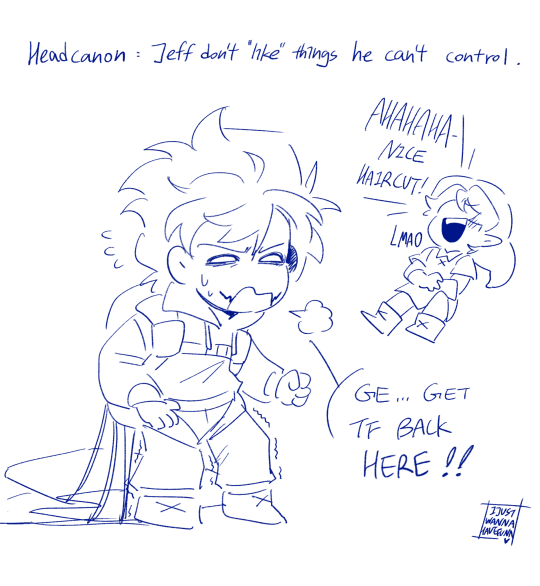
When I first saw that TikTok, I had so many questions. Someone also tagged me, so I had to question it again a week later. 😭
I also believe the original image is from a video. But I can't seem to find it anywhere; if anyone knows where I can find it, please let me know lol 😂
And the person who made the TikTok video (when I first found out) is @darklinks_fangirl I'm not sure if it's a repost or not? But thank you for sharing this monstrosity 😂
8K notes
·
View notes
Text
slowly creeping back to my eyestraining bg phase ew
3K notes
·
View notes
Text
Just like when we were younger
I love opening my Zelda games and just run around enjoying the view. I think BEN should do that too: Take some time to visit his best friends and play in the forest or the beach with them :) It’s so sad that he keeps tainting pictures they take together though… It seems you can’t play pretend forever.
#benny worm by jack stauber was looping in my head when drqwing this btw#ben drowned#ben creepypasta#creepypasta#creepypasta fanart#creepypasta ben drowned#tw blo0d#cw blo0d#well maybe its paint#who knows#not me i just draw things that look pretty#it ttook 3hrs btw!#first procreate AND apple pencil drawing!#gone are the fingers days#that sounded erm
70 notes
·
View notes
Text
KITTYYY!!! >^<
making this blog to put my creepypasta art because i have organisation-lover-autism :3333
cuter version (i tried putting it as my pfp and gave myself a heart attack so Its not a success!)

#tw unsettling#tw creepy#tw horror#maybe?#im gonna be honest i didnt try to be scary i just put random colors and he appeared#jeff woods jeff woods jeff woods#i hope he appears in my bedroom so we can play cards together#that wasnt a metaphor for something else#i want to destroy him at a normal family game and change the trajectory of his life#i can make him WORST#jeff the killer#jeff woods#creepypasta
45 notes
·
View notes
Text
Yall … YALLL THE LINEART im obsessed (wip)

#im using the fucking lasso tool#also i apparently have to prove my human-ness on tumblr#which is hard considering im rarely a full human most of the time#a ‘80% masculine ubran legend. but really we can’t tell for sure’ defines me best atm#i cant wait to pull for neuvilette tho#im a dog really#work in progress
0 notes
